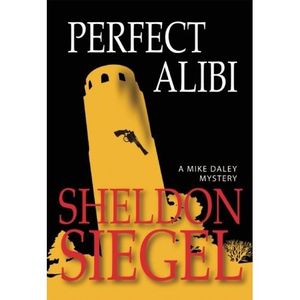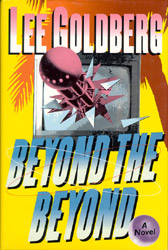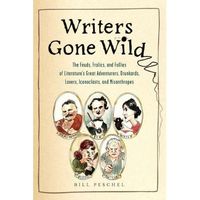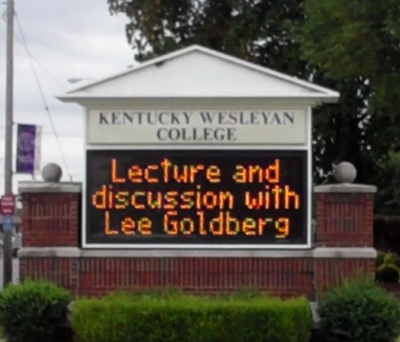Other Random Posts
Welcome To My Life
This is video is so funny because it’s so true. What published author hasn’t had this conversation at a conference or a booksigning?
If you like his, you’ll also enjoy a similar video regarding the ridiculous hysteria surrounding MFA programs lately.
The Mail I Get
I got an unsolicited email today from a newbie author asking me to read his book and review it. The solicitation itself was polite enough, but where the author stumbled was in his pitch:
The book is aimed at the adult male market; the book provides a means for males to escape to some harmless, male orientated entertainment without being made to feel guilty about doing so. At the risk of sounding corny, I would describe the book as a ‘rattling good read for real men.’
This male doesn't need a means to escape to some male-orientated entertainment that will make him rattle.
Chandler’s Big Bender
 I'm in Walla Walla, Washington for my mother's funeral…but while I am away, my friend Bill Peschel has kindly stepped in to keep my blog going with an excerpt from his terrific and very entertaining new book Writers Gone Wild. Here's a story about Raymond Chandler, John Houseman, three double martinis, a doctor, a limo and a screenplay…
I'm in Walla Walla, Washington for my mother's funeral…but while I am away, my friend Bill Peschel has kindly stepped in to keep my blog going with an excerpt from his terrific and very entertaining new book Writers Gone Wild. Here's a story about Raymond Chandler, John Houseman, three double martinis, a doctor, a limo and a screenplay…
Some writers go to great lengths to finish a work. To finish a screenplay, Raymond Chandler got tanked.
At fifty-seven, the writer’s best work was behind him when he was hired by Paramount for a rush job. The studio’s leading actor, Alan Ladd, had been drafted into the army, and the executives wanted to keep his profile with the public alive by releasing a movie while he was away. A script wasn’t ready, but Chandler offered to write a new one based on his half-finished novel, “The Blue Dahlia.”
But with the date for Ladd’s induction set, shooting began with only part of the script written. Chandler workedfast, but as the filming caught up, the executives worried whether he could finish on time. With only two weeks left, a Paramount executive called Chandler and offered him a $5,000 bonus if he succeeded.
The next day, a shaken Chandler met with the producer, John Houseman. The offer, he said, implied they had no faith in him. It was an insult to his honor to take a bonus for a job he had agreed to do. Now, he didn’t think he could even finish the script except under one condition: He would have to get drunk.He always wrote faster that way.
Chandler had a list of his needs: two limousines with drivers available around the clock to fetch a doctor, deliver script pages to the studio, and drive the maid to market; secretaries to take dictation; and a direct phone line to Houseman.
Houseman considered the risks. Chandler hadbeen a heavy drinker most of his life before drying out. A relapse could kill him. Still, the movie had to be made, and he didn’t have any alternative. He agreed, and at a celebratory lunch, Chandler loaded up with three double martinis and three double stingers.
For eight days, Chandler drank, passed out, wrote, drank, and passed out again. Twice a day, the doctor shot him up with vitamins and fed him glucose intravenously. Chandler finished the job with days to spare but spent the next month recuperating in bed. The script’s last line was “Did somebody say something about a drink of bourbon?”
One Day and Counting…
Today I trimmed hedges at the house where we will be shooting tomorrow night …not exactly what I expected to be doing in prep, but we’re a small film, with limited resources, and I knew how I wanted those hedges to look. So it seemed like the easiest way to get it done. I’m sure Tarantino and Spielberg trim hedges during prep, too. I rewarded myself with lunch at the Moonlite BBQ, where I enjoying listening to all those Kentucky accents.
Afterwards, I changed shirts and spoke at Kentucky Wesleyan College about pre-production film-making. I had a great time and I think the audience enjoyed it too. Afterwards, I did a quick interview with the campus radio station and then headed to the Riverpark Performing Arts Center to take a last look at all the props and run the production meeting, which went quickly and smoothly.
I marked the end of our months of pre-production by taking Roxi Witt, Todd Reynolds (one of our actors), PJ Starks and Rodney Newton out to dinner to thank them for all their help making this movie happen.
Now all that’s left is to start shooting tomorrow… unfortunately, I brought my Goldberg luck with me, so Owensboro’s long, dry, sunny streak is about to be broken with thunderstorms all weekend. This is likely to complicate things, particularly our exterior work, but it wouldn’t be movie-making if their weren’t a few complications….
Hilarious Shatner Spoof
Jason Alexander and Stephen Collins "recreate" a scene from STAR TREK: THE MOTION PICTURE back in 2004 on Craig Kilborn's show.
TV Main Title of the Week
Notice the wardrobe change in this main title from a later season…
Why I Love Harry Whittington
This Pulp Serenade review of PRAIRIE RAIDERS pretty much sums up why I love Harry Whittington’s books. They write, in part:
One of the hallmarks of a Harry Whittington book is a protagonist driven by an all-consuming obsession, a mission that rises above morality, a cause that is more important that their lives. It is characteristic of both his Crime novels as well as his Westerns. In To Find Cora, Joe Byars hunts for his missing wife and eventually finds her in the clutches of another man as fanatical and as himself. In Shadow at Noon, Jeff Clane wasn’t supposed to survive the set-up duel, but he did, and found himself in more trouble than ever—only his thirst for vengeance keeps him going. And men, money and murder can’t satiate Bernice Hopper’s desire for happiness in Fires that Destroy, a title that is the perfect metaphor for many of Whittington’s characters and their desperate pursuits.
[…]A lean 103 pages, Prairie Raiders bolts along with the same force and intensity as Clay Webb. Whittington’s prose is fast and hard, the Western action stirring, and with a strong sense of psychology and character (two of the author’s strongest suits). There’s not a moment or a word wasted in this book. Chalk up another winner to the prolific writing machine that was Harry Whittington.





